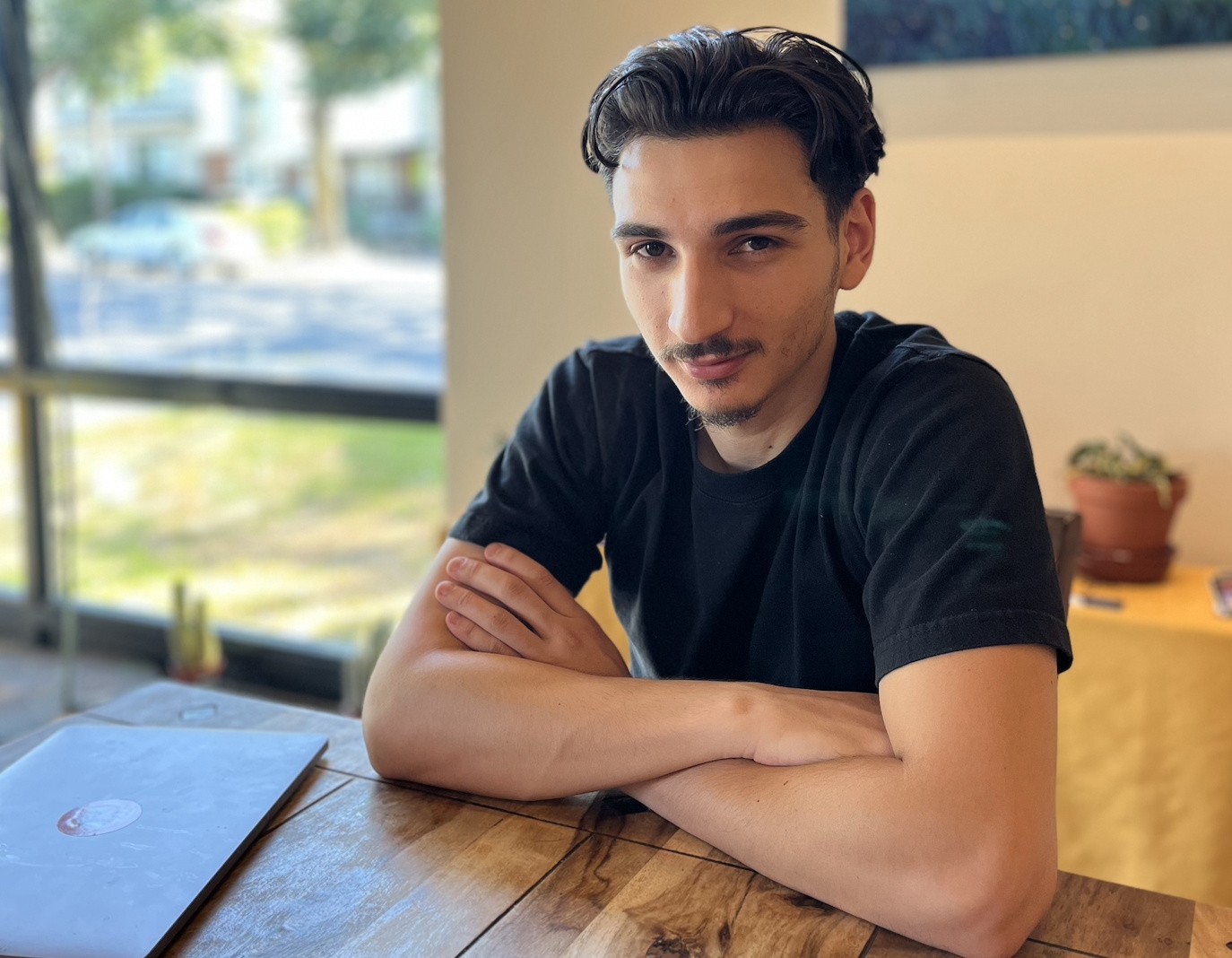Last March, the pilot project for public writers ended in Quebec. However, demand remains strong, especially among immigrants who are struggling to integrate, in particular because of their difficulties in mastering French. Was this service essential for the adaptation of newcomers?
“We need to help them immediately”
In a café at the corner of Crémazie Boulevard and LaJeunesse Street, we find Michel Huot, a former public writer employed by the organization Accueil aux immigrants de l'est de Montréal (AIEM) and now project manager for the same organization. Denim shirt, pen in his pocket and tablet ready to use, the retiree displays boundless energy.
From 2022 to 2024, he was at the heart of the pilot project for public writers funded by the Ministry of the French Language through the Regroupement de organismes en francisation du Québec (ROFQ), before its suspension. His role was essential, especially for people overwhelmed by administrative challenges. “Once newcomers settle in, they get a wake-up call: a landlord who wants to increase the rent excessively, an initial tax return, incomprehensible letters from the government,” he lists with the precision of an orchestra conductor. "So that's where the public writer comes in.”
From his backpack, he pulled out a document: a printed screenshot of the list of his files — a picture of the multitude of lives he touched. “Last year, I met about 350 people, and that was only available once a week.” Every Friday, from 8:30 a.m. to 4:30 p.m., Michel Huot met dozens of people in his AIEM office during appointments for 30 minutes each. “The objective at that time was to understand what the need was. Then, on Mondays, I followed up on files and closed the requests,” he explains before adding: “There is an emergency for these people, and you cannot tell them: 'I only work on Friday, we will meet again next week for follow-up.' No, you have to help them immediately.”
With his pen, he points to a file. “I wrote a lot of letters of invitation for immigrants who wanted to bring their loved ones to the country for special events, but also letters requesting housing.” These letters, along with other administrative documents, are essential to facilitate their adjustment.
Although documents written by a public writer are not legal documents like those signed by a lawyer, they nevertheless have a certain weight and credibility, insists Michel Huot. “The fact that a public writer represents an organization like AIEM, recognized in the immigration network and with embassies, provides additional recognition at no cost.”
A commitment beyond words
With his eyes fixed on his document again, he said: “I remember a case where a gentleman was desperately looking for an apartment. He had found a tenant who was ready to sublet his apartment, but on one condition: she absolutely wanted the new tenant to buy the furniture she wanted to leave behind. In addition, she asked for a sum of money in advance to conclude the sublet. So this man came to see me to find out if such practices were legal.”
After some research, Michel discovered that this tenant had only one intention: to take advantage of the situation. “So I made him understand that these were illegal things.” But for dishonest landlords, the public writer never hesitated to intervene in a concrete way, in particular by sending them letters directly. “I had fun. I liked that, intimidating crooked owners! ”
Every injustice is a driver for Michel. “There is an adrenaline rush in me when I see that people are abused with impunity,” he confides, clenching his fist. "These people are under enormous pressure, especially when they have to prove that they have found housing in order to move forward with their administrative procedures,” he says.
Between two sips of his latte, Michel also remembers a Haitian mother who came to him after knocking on every door to assert her son's rights. “This lady arrived through our organization's pediatrician,” he says. The woman's son had special needs, and she had been fighting for two years to get him transferred to a special school. “The director of the school where her son was enrolled turned a deaf ear — no appointments accepted, no answers to her requests. It was unbearable. We finally understood that she was a victim of racism.”
Michel then felt a strong anger rising in him. “I did not understand that a school director, who was supposed to defend children, refused to help a family in urgent need,” he said, his eyes wide open. For him, it was no longer just a question of writing a letter or filling out a form. He then embarked on a veritable marathon of meetings, “Seven or eight appointments,” he says, typing his pen on the sheet. Together, they wrote letters to the school board, filed complaints against the school, and restarted meetings with management. In the end, the school board agreed to transfer the child to a school adapted to his needs. “It was a victory! ” exclaims Michel.
It was after reading a letter that the mother wrote to him to thank him that he realized the meaning of this triumph. “It almost took out my heart and tears.” He paused, seeming to relive that moment.
“When you read these words, when you see what it meant for her, you realize that all this work, all these hours spent writing, calling, is so much more than just an administrative service. That's the real reward for a public writer! It is priceless! ”
He continues, before bursting with laughter: “But that's why I answer all requests... except love letters! ”
Lack of funds — public writer at home
“I already wrote a love letter once,” says Suzanne Boivin, a language teacher who teaches adults and a public writer at home.
Inspired by Suzanne Coupal, a retired judge who became a public writer, Suzanne Boivin embarked on the adventure in 2022. “It was what I already did naturally, to help people write documents. So, I told myself that I could offer my services in a community centre.” After trying to collaborate with an organization in Saint-Michel, the lack of funding forced her to work informally from her own home.
“I don't have a lot of time, but the time I do have, I devote to my community.” In the residential neighbourhood where Suzanne lives, her neighbours don't hesitate to ask for her services. “Often, people I've helped recommend me to others. I never say no, and word-of-mouth is very effective,” she says.
Thanks to her legal background, Suzanne writes love letters as well as demand letters. “Sometimes I help people who need a letter to resolve a dispute with their landlord. Or, I have already helped people who were victims of lawsuits who did not have the means to defend themselves. I offered to help with the writing, explaining that if their case required legal representation, they would only have to pay for a lawyer.”
Her support as a volunteer public writer is greatly valued by her neighbours. However, the lack of funds prevents her services from growing and reaching more people. “If public writers were directly hired and supported in a sustainable way, it would allow people to feel more supported,” she adds. "Immigrants, in particular, are often very isolated and left to their own devices. It would need a resource that they could really rely on.”
More personal needs

The Montreal library network has been collaborating for several years with the Library Writing Residencies program of the Union of Quebec Writers, suspended since 2023. This program allowed two libraries in the network to welcome one writer each year for a period of about six months. Despite the suspension of this program, some libraries continue to offer a public writer service in their programming this fall, particularly in Anjou, Verdun and the Ahuntsic library.
It is precisely in a small office in the Ahuntsic library that we meet Benoît Gignac, a volunteer public writer since 2021.
Although the space in which we find ourselves is empty, white and impersonal, the experience of being a public writer takes on a whole new dimension for Benoît. For him, each appointment is a new encounter that brings life to this place. “I receive all types of people and requests, but it is very often for personal requests,” he explains.
At 69, Benoît has a natural charisma, and his soothing voice immediately inspires confidence. His eyes are lost for a moment on the bay window in the office, and he smiles as he mentions a young girl he is helping to write poetry. “She makes a lot of mistakes in French, but her ideas are very beautiful,” he says. Together, they go through the words, explore the nuances, and look for the terms that best express her thoughts. “What I do is help them find their voice, express what's in their heart, with the means they have.”
The service he offers is simple: interested people make an appointment with the library, which then redirects them to him. Before each meeting, Benoît takes the time to talk briefly with his interlocutors to make sure that their needs correspond to what he can offer.
He is often asked for very specific requests. “They are generally women, and almost all of them have an immigration background,” he explains. In particular, he recalls a woman who was trying to pass an exam from the Ministry of Education to become a French teacher. “She failed twice because of time management. She was so focused on the details that she could never finish on time. I just said to her, 'You don't have to write a perfect text, you just have to stick to the deadline. '”
His work goes well beyond editorial assistance. It gives people tools to navigate complex situations. “I don't teach the language,” he insists. "I help them overcome the concrete obstacles that are in front of them.”
The mission that Benoît has given himself is more similar to that of a professor of writing than to that of a public writer. He often doesn't write for the people who ask for his services, but he helps them write for themselves. “I work this way more often because these are people who come back a lot. These are projects that I have with them.”
Even if some requests may seem less urgent, the request remains: “There are always people coming, so there must be a need... But I admit that I hesitated to respond to your interview request because I don't want it to become too well known — I could be overwhelmed! ” he confides with a laugh.
As public writer services are becoming increasingly rare in the province, Benoît remains pragmatic. “I love what I do, and I do it my way. If others want to get started, great, but I'm not going to make a crusade out of it. However, if someone starts a petition, I will sign it,” he said with an amused smile. This is not a personal struggle, but a discreet contribution to the community. “I am doing my part, as all citizens my age should be doing, whether by cleaning the streets or by delivering meals. In my case, I write, but I do what I can, within the limits of my abilities.”
The end of the pilot project for public writers leaves a void for newcomers, who already face numerous administrative and linguistic challenges in Quebec.
The support of these public writers, whether voluntary or paid, remains crucial to facilitate their integration. A question therefore arises: why abandon such an essential service, when demand is constantly increasing?
At the time of writing, the Ministry of the French Language had still not answered this question.




.webp)



%20(1).jpg)
%20(2).jpg)
.png)